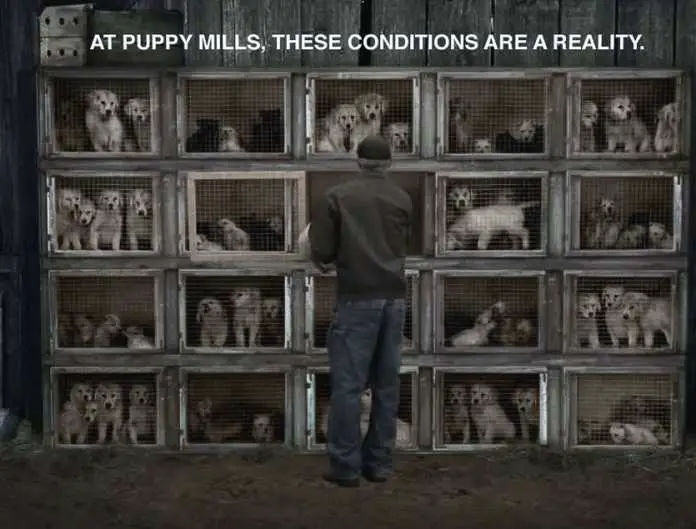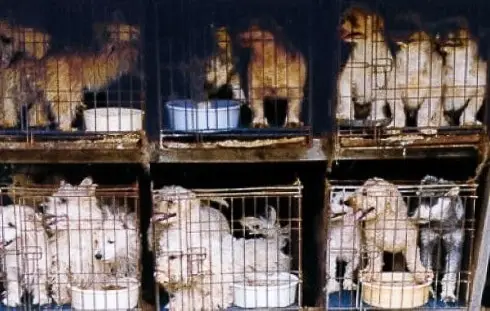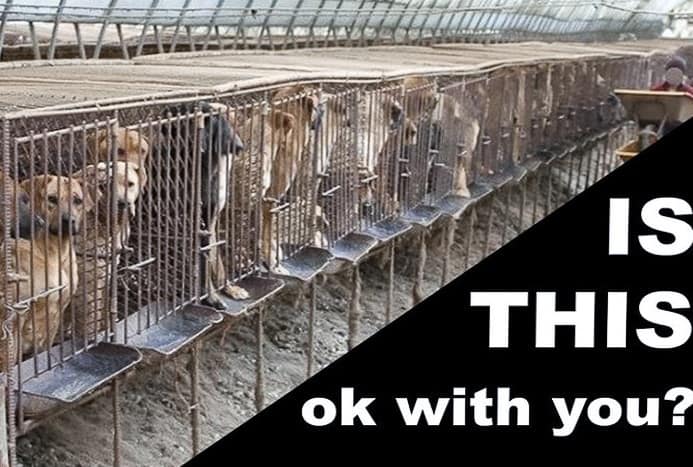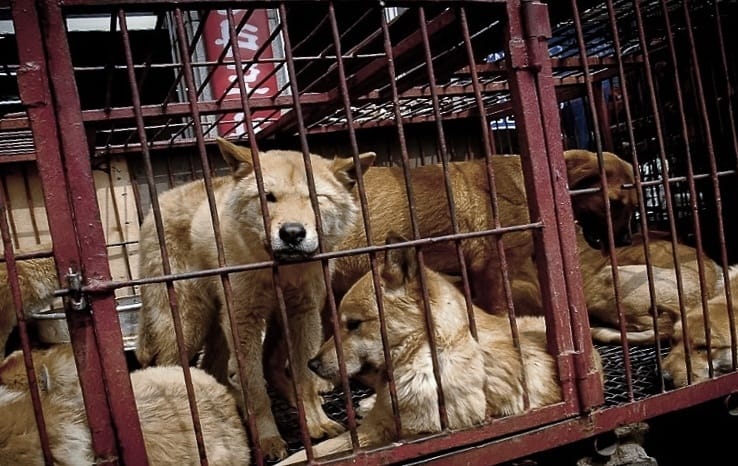Last Updated on 02/01/2021 by Veronica Jones


What Is a Puppy Mill?
Not long ago I was surfing on my Facebook page, just looking through news I might have missed. There was one post with a link leading to a petition to close a puppy mill in Kentucky. Being a law-abiding citizen of my country, with a healthy dose of morality and understanding, I decided to go check out the page to see what all the noise was about. Holy son of God! It was terrible, to say the least (ASPCA proves). Poor creatures of all kinds were being kept in cages, almost by the dozen, under the scorching sun with rare tree shadow around. Those who were “lucky” were chained to their kennels and were lying on dry dirt, barely able to reach the shadow. I’m not gonna tell you more about these poor dogs who were facing their doom locked up under Sun. After all, seeing them all crawling atop one another, striving to get human attention and compassion, seeing them covered in mud, dirt, and their own feces with little chance for salvation, can break anyone’s heart.
Such an outrageous fact of horrible treatment made me not only sign the petition, but dig deeper about this whole “puppy mill” thing. The first thing I did was look up what a typical puppy mill is. Here’s what my research says, “A puppy mill is a commercial facility destined for breeding dogs that sets priority of making money over the well-being of animals.” I was expecting to find something like this. Readers may argue, saying, “Alex doesn’t know a damn thing about mills yet speaks of ‘em in a prejudiced manner.” Man, how I wish this were true. Well, the truth behind it tells the same conclusion: where profit and zeal for making money meet each other and leave out common sense, morality and well-being of a person or creature who is more dependent, there is nothing good left to expect. So a typical puppy mill is a torturous fear factory where poor animals are treated as cannon-fodder, and one can only guess where his/her dog came from.
Of course, I hope there are puppy mills that actually care about every dog born; that feed them constantly and let them walk in fenced-in yet spacious playgrounds where they can feel somewhat free, but the statistics, overall, say the contrary. And the statistics that I’m gonna tell you in the following passage are facts that no-one can or should deny. It will reveal to you the scale of dog exploitation across the whole country.
Puppy Mills: Facts and Statistics
When you enter a local pet store anticipating to meet a new friend who will live, from now on, a happy life with his new family, you should know that there is a 90% chance that the dog was bred mainly for sale – to you directly or indirectly through a pet store. As we now know, almost every dog comes from so called “dog farms” where little or no medical attention is given to them. Moreover, they are bred with disregard for heredity. Puppies suffer from hereditary diseases such as heart problems, respiratory disorders and blood vessel issues (HSI shows). So the puppy that you are about to buy is likely to have any disease from parasites to pneumonia. Though anyone who is buying a pet from a store is saving one more life for sure, this medal has a negative side side: every dog bought is going to be replaced by one or even more dogs whose fate may not be so promising…
Speaking in terms of statistics, here’s what I’ve found out:
- More than 2 million (!) dogs are born in mills throughout the nation every year
- More than 1 million dogs get euthanized every year
- Female dogs give birth to pups more than once a year – 2 times at least. At such a rate, by the age of 5-6 years they are already burned out and are taken out of their misery (and not always in a humane way).
- Puppy mills have existed since the 1960’s.
- There are almost 10,000 mills in the US (digits comprise number of unlicensed and licensed facilities).
- According to studies, almost half of all dogs sold to pet stores are ill.
- 9 out of 10 puppies sold in pet stores come from puppy mills.
- 100% of all the puppies sold in pet stores need urgent vaccination and medication against parasites.
- As you are reading this sentence, around 170,000 dogs are living in licensed facilities for breeding purposes, not to mention how many of them drag out a miserable existence in unlicensed backyard sheds.
This data is drawn from surveys carried out by the Humane Society of the United States and the American Society for the Prevention of Cruelty to Animals.
There is another fact worth mentioning, which simply comes out as a conclusion to the facts stated above. There is no legal definition of what we all call a puppy mill, and when someone at a pet store shows you documents and certificates that “prove” the humane origin of a dog, he/she is trying to make a fool out of you. A responsible breeder will NEVER sell a dog through a pet store without the possibility of screening and learning more about the potential buyer – whether he will ensure good housing, nutrition and care, or not.
Amish Puppy Mills
Why am I speaking of the honorable Amish in the context of this topic? I’m not trying to blacken their dedication to the Word of God. Many people who like to eat healthy, organic food would certainly buy their groceries at local Amish markets or farms. We have stereotypical views of the Amish community as great farmers and hard-working laborers, but their eagerness to follow the Ten Commandments and interpret the Word of God way too literally is apparently seen with Amish puppy mills.
Being farm dwellers, Amish folk organize their own puppy mills for lucrative purposes. Every Amish community usually has its own puppy mill, alongside their usual cattle barns and poultry houses for their own consumption and for trading with other communities and outsiders who come to buy fresh products like eggs, dairy, meat… and sometimes puppies. In order to sell a puppy, an Amish mill usually hires a puppy broker – a man whose sole duty is to get feedback from a pet store, come once every several days, pick the puppies that he finds to be marketable, then pays right on sight and leaves with freshly bought critters for the local pet store. The Amish also sell puppies via dog broker sites like nextdaypets.com and puppyfind.com to name a few, or through online classifieds such as EBay and Craigslist, as well as at local flea markets.
This whole passage almost retells the same thing you already know about puppy mills: where there is money, humanity steps aside. But it doesn’t mean ALL of the Amish folks are lucrative breeders, squeezing money out of their animals, so I want to say that I don’t generalize all Amish people nor do I state that all of them are animal torturers. It’s simply human nature that sometimes makes us do what we normally would never do, so we should remain calm and not come under the influence of the instincts and desires to manifest our power.
Legislation and Controversy
Passed in 1966, the Animal Welfare Act states the following requirement, “Any breeder who has more than 3 breeding dogs, and sells puppies for commercial purposes, must have a license issued by the Department of Agriculture.” But the standard that a breeder must correspond to is minimal. It suits breeders just fine, but not the dogs. For instance, it is normal to keep a dog in a cage that is merely 6 inches longer than the dog! Wire flooring without a solid surface and stacking cages one upon the other doesn’t contradict the law. It means that whatever I may think to be inhumane and cruel is legal, so “it’s not a big deal.”
The future is still to come, so what can we do now?
Rapid growth of e-commerce has propelled the breeding industry all over the world. The US market has faced, in recent years, a significant rise of imported dogs, which usually manifests bad health condition that could harm other animals and even people. In order to protect the inner market (and maybe even breeders) the US Government suggested making an amendment to the Farm Bill of 2008 that forbids importing puppies less than 6 months old for the purpose of sale and -drum beat- all non-US breeders must present a certificate stating that the dog has no health issues and has all of the necessary vaccines! In August 2014 the US Department of Agriculture adopted the implementation of the law in all of the national entry ports. The year before, in September 2013, the USDA changed the federal Animal Welfare Act regulations and, from now on, even Internet puppy mills are subject to inspections.
Many of the country’s states chose to adapt higher standards of care concerning the dogs being bred for commercial purposes. Now these standards, in terms of comfort and dwelling conditions, surpass those set previously by the federal Animal Welfare Act. Although the rest of the states remain silent and have no laws regulating breeders at all, and other states don’t even require ANY licenses and inspections, these new standards set by states, and operating on the territory of those states, is a big step toward strict regulation of the industry, and perhaps abolishing it as phenomena in the future.

The future is still to come, so what can we do now?
Outlawing Puppy Mills
The Humane Society (HSUS) is a rather serious force striving to abolish animal torture throughout the nation, and puppy mills are their key target. The Society is constantly struggling against all existing low standards of care for dogs in breeding commerce by undertaking legal efforts and educating both sellers and customers of this market. No matter what measures are being taken by the Federal Government at the moment, one thing will remain the same – the conditions that the dogs are kept in are always underestimated. It seems that the government officials pay more attention to the way they can subdue and control this vast market (which brings in more than 1 billion dollars of profit a year) for their own benefit, instead of battling the main reason that causes such societies as the Humane Society to appear – the fact of animal cruelty itself.
If we want to win this battle, we need to carry on by way of juridical proceedings that evaluate what animal cruelty is because breeders don’t think the business they are occupied with can have a moral aspect – it’s still the language of profit speaking for itself. But there is a firm strategy that brings results:
- Campaigns improving the standard of care have greatly increased these standards in 35 states through the laws already passed.
- The HSUS constantly carries out investigations of puppy mills, the majority of which are known to be illegal. These investigations have already led to shutting down dozens of mills and pet stores all over the nation and have led to multiple lawsuits.
- Since 2006, more than 10,000 dogs from over 50 puppy mills have been rescued, sheltered and transferred to their new loving owners.
- The HSUS is also working on encouraging adoption from only responsible and proven breeders.
Don’t buy from pet stores – every pet bought is a soul saved, but the reproducing dog conveyer will keep on rolling. Eradication of pet stores won’t happen anytime soon, so the Society tends to help them switch from pure commerce to a business approach that favors mainly adoption. Dogs from shelters are top priority from now on. As a result, during past years, the HSUS has helped to adopt more than 3000 dogs.
10 Signs That Your Pet Is from a Puppy Mill
Now that you know puppy mills are sheer evil, it’s time to make sure you won’t buy a dog from a mill. Go through these 10 signs below that I have summarized, and you will know for sure whether the puppy you are intending to buy is from a puppy mill or not:
Keep away from pet stores while searching for a pet at all time
- Coat and cleanliness. It is evident that dogs from a commercial kennel are likely to be kept in harsh conditions. A dog from a mill is likely to have a poor packed coat with a specific kennel smell.
- Have the dogs been given vaccines? Mills make money on dogs, not spend it on them. Hence the pup, as well as its parents, may not be vaccinated at all. Or, on the contrary, they may be vaccinated two times already. Always ask about vaccines!
- The breeder offers only one or two breeds. A breeder with good and proven reputation will never offer more than one or two breeds. If he offers you more, it’s for sure a puppy mill.

That’s how they live - Who are the parents and where are they? If the seller/breeder knows nothing about the puppy’s parents or simply doesn’t allow you to see them, you should turn and walk away. There is a big chance that the puppy was not even bred, just resold.
- The puppy comes from any other state than its home state. Keep away from pet stores while searching for a pet at all times. This is rule number one. If the desire to buy is bigger than your prudence, just make sure you don’t buy a pet coming from Midwest states.
- Meet me outside. You call the seller and he says something along the lines of, “Meet me at the parking lot,” or, “You’ll find me near the old factory,” and should you ask about visiting the kennel, he refuses. Know that it is a puppy mill he is speaking of. There is no reason for not seeing the place where the puppy was born other than extreme circumstances.
- Why do you have so many litters? You should ask the breeder about the quantity of litters he has at his site. If he says something like, “I have two litters and two more ready to go,” that’s a sign that he’s running a mill.
- The breeder promises a particular size. If a breeder promises you that the puppy will grow to become a dog of a certain height and weight, there is something to be concerned about. No one, not even a genius geneticist, can predict what the puppy will grow into.
- Where’s the contract? Reputable breeders always support their words with paper. Agreements and health contracts are a must.
- Breeders get rid of young pups. Breeders, or those guys at the pet store,will give you a young puppy so that they will no longer have to take care of it. Any breeder always tries to get rid of a puppy who is less than 8 weeks’ old, which is the minimum age you can take a puppy away from its
There’s a Puppy Mill in My Area! What Can I Do?
The first question you should ask yourself is whether it is legal or not to run a breeding facility in your home state. It may sound somewhat outrageous, but keeping a dog in a cage that complies with the requirements may be legal (again, controversy). But should you see evidence of cruelty, connivance, or neglect you must contact local law enforcement, the sheriff, a humane society or even an animal control agency.
The following things can be considered as neglect or cruelty:
- Animals kept without food and water
- Sick dogs without medical attention
- No adequate shelter from sun and rain
- Any recorded evidence of battery and abuse
Before you address the local authorities on the matter, prepare all of the details that may be valuable for evaluating your particular situation: video recordings and photos will speak for themselves. After submitting a complaint, follow along with the case and contact the authorities once a week to make sure the case is an ongoing investigation. Should any particular and vital information appear, the authorities will not share any information which can be viewed as a good sign – someone is about to face justice. For any questions concerning your own battle against animal abuse in any way and not just related to puppy mills, please write directly to The Humane Society via e-mail: [email protected].
As we have already learned, the US Department of Agriculture manages the situation and its special Animal Care Division can help you a lot. Firstly, you should learn whether the puppy mill owner has a license issued by the Department. Secondly, make sure the facility that you are trying to shut down is NOT a wholesale breeding one, because these kinds of facilities are required to have licenses and therefore are systematically inspected. But it doesn’t mean the breeder remains a law-abiding citizen at all times. Visit the US Department of Agriculture website so you can read about the most recent inspections carried out within the premises of your state, and particularly in your area, then carry out a comparative analysis which will show whether the investigated facility is subject of control and inspection or not. If not, it comes down to the fact that the owner is dishonest and has something to tell the sheriff.
If you have any information on the case, you can also contact the HSUS by phone at 1-877-6455-847 or 1-877-MILL-TIP. This so called “HSUS Puppy Mill Task Force Tip Line” is available to anyone who wants to share information on any crimes involving animal abuse, and especially these notorious puppy mills.
Conclusion
Puppy mills are an ultimate showcase of human indifference towards creatures who depend solely on them. Dogs, unlike cats, are far more devoted, show rather complex intellect, have feelings and understand pain, torture, and varying temperatures as well as care, love, tenderness and the mood of his owner. It is easy to betray a dog, but it will never betray you.
I address to all of those breeders who may be reading my words, may God forgive you and what you do. I am a proud US citizen who is grateful for his well-being and the opportunities that the nation gives him, but I cannot understand why people who live in our great country choose such sadistic ways of making wealth. Not only is it inhumane, but many people pay attention to the situation, which is seriously blackened by the way you manage your business, and undertake all measures possible to shut you down. The industry itself constantly faces challenging legal procedures that will make your work disadvantageous and, hopefully, extinct. Your numbers are dwindling every day and I hope that humanity will regain its faith and power to step up and change the world for good. Especially for those little creatures who are still kept captive and need human compassion and help.
Sincerely Yours, Alex and his devoted friend, Jeb, from Kansas.

